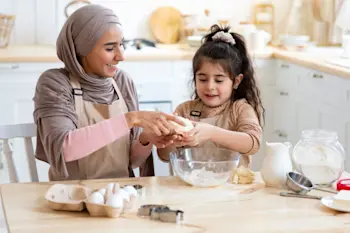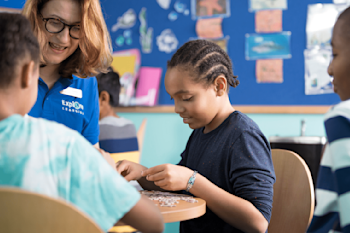Everyday Maths Activities For Children Real Life Learning

You’ve probably never stopped to think about it, but maths helps us with so many everyday tasks! From making lunch to understanding bus timetables – there are hundreds of everyday things that involve maths.
So, why not make the most of this learning opportunity by making maths practice part of your everyday family routine? In this blog, we share some simple ideas on how to incorporate more maths into your daily routine with your children.
What do we mean by everyday maths?
Everyday maths is the maths that is required to live our daily lives. This includes simple mathematical concepts such as adding, subtracting and multiplying or telling the time. It’s the maths we use every day, usually without even noticing!
How is maths used in everyday life?
Maths forms an important part of everyday life.
We have to admit that sometimes when a child is studying quadratic equations or Pythagoras’ theorem and they ask “why do I need to learn this?” it’s hard to convince them that they may use it in the future! There are, however, so many ways we use lots of areas of maths in daily life and you might not even realise you’re using it.
Here are some simple, everyday examples where we use our mathematical skills…
Managing money and budgeting
Shopping
Following recipes and making food
Working out distance for travel to school, work and beyond
Working out how long you have to get ready for school
Understanding sports results and statistics
Playing an instrument
Crafts such as sewing
Measuring for DIY home decorating projects
Exercising
Time management
Driving a car
Playing video games
Knowledge of maths is also an essential part of many jobs – even careers that are not based on maths usually involve some level of addition and other basic skills. Take a look at these job titles that all use maths…
Fashion designer
Construction worker
Doctor, nurse or medical professional
Weather forecaster
City planner
Marketeer
Inventor
Architect
Astronomer
Painter
Computer science teacher
How do you use maths in everyday life?
Charlotte Gater, Head of Curriculum at Explore Learning, shares some everyday mathematics examples…
Making your dinner?
Making your dinner uses all kinds of maths.
Firstly, money calculations to see how much everything you need costs. Lobster every night? Nice thought but you’ll use maths to probably rule this option out.
Is your recipe for two people but you need to feed four or six? Then you’ll use times tables or ratios to work out how much more ingredients you’ll need.
Washing up the dishes? You’re calculating how much washing liquid to squeeze into the water using ratios.
Lucky enough to have a dishwasher? Then picking the settings and the right temperature requires maths knowledge.
Off on your holidays?
You’ll be using maths to work out the best deal for exchanging your pounds and to work out how much you are actually spending in another currency.
Addicted to Candy Crush?
(I had to delete it as I was getting pains in my hand!) Tired of seeing your child glued to Minecraft? Well, it’s not all bad. Although I wouldn’t advise computer games as a child’s only activity, they can help by teaching maths skills development – from using a strategy, to angles, addition and problem-solving skills.
Feeling stylish?
Are you planning a home makeover? Working out how many tins of paint you’ll need or rolls of wallpaper will require some number crunching – or you’ll end up with litres of old paint kicking about your house!
Planning a fun-filled family Monopoly session?
Use your maths skills to make sure you’re not being short-changed…
Avid football fan?
If you’re an avid football fan, you’ll be using maths to work out how many points your team needs to win the league, what the goal difference needs to be or what they need to do to stay out of the relegation zone. You’ve guessed it, your handy maths skills will allow you to do this!
Off to do the weekly shop?
Well, you’ll need to use maths to calculate what you need to buy. From working out how many slices of bread you’ll need to make everyone sandwiches to how many nappies your newborn baby will fill! You may also need to work out percentage discounts. You’re using averages, multiplication, addition skills.
If I knew you were coming, I’d have baked a cake
When cooking and baking, a recipe calls for measurements skills, estimating to know how much butter icing to make, spatial awareness skills to visualise how big to roll out icing and symmetry to create a stunning design. Now the only thing left is to use my fraction skills to cut it into equal pieces. (Or maybe I’ll just let my skills slip and make mine a bigger slice!)
Next time you’re busy doing one of these tasks, find ways to encourage your child’s maths brain to kick into action!

Maths in daily life: Project ideas
To help get you and your family practising more maths (without too much effort!) here are some more ideas…
Everyday maths activities and games
Estimation jars– fill a jar with stones or sweets and everyone has a go at guessing how many are inside. Once everyone has made their predictions, find different ways of counting them by grouping them in 5s or 10s for some multiplication practice
Card games– all card games contain an element of maths, so pick your family’s favourite and get playing! Our top picks are pairs, spoons and speed
Treasure hunt– hide items around the house and create maths question cards that children have to answer before they get their next clue!

Everyday maths questions
Keep them on their toes with some maths questions as you go about your day…
How many packets of cereal do we need to feed all four of us for breakfast this week?
If you buy this book, how much pocket money will you have left for the month?
If it takes 20 minutes to get to school on the bus, what time do you need to wake up to be ready in time?
How many cups of flour do we need if we want to make this recipe for the whole class?
If we’ve already been driving for 2 miles at 40 miles per hour, how long until we reach grandma’s house?
Everyday maths worksheets
If you’re looking for more ways to up their maths at home, our teaching maths skills development are a great place to start.
From a fortune teller game to symmetrical tiles – have a look for teaching maths skills development with a difference to keep them entertained.
Everyday maths challenge
What can you do in a minute? Have a go at setting different challenges with a time limit. Maybe it’s star jumps, writing out the alphabet or even everyday household chores! This fun activity is great for counting and telling the time (as well as letting out some excess energy!)
For more resources, check out our guide to KS2 maths.
Why maths is important in our daily life
Because maths is involved in so many of our daily tasks, it’s important for children to feel confident with core maths skills.
A good grounding in maths not only helps children in their future careers, but also improves problem-solving and critical thinking abilities. Having a good grasp of core skills such as addition and multiplication is essential for everyday activities such as working out costs and being on time.
The benefits of doing maths every day
Just a few minutes of learning maths a day can help children to…
Improve problem-solving skills
Get better at critical thinking and decision making
Develop observational skills
Understand how to manage their finances as they grow
Better understand the world around them
Need a little extra help? Find out how to find a maths tutor for your child.

Everyday maths practice – get started!
Hopefully, you can now see just how often people use maths in real life! We work with our members to demonstrate just this – and help awaken their passion for numbers.
Our maths tuition includes both core and applied skills to give them the confidence to tackle maths problems at school and in the real world.
Come and see for yourself and book your free trial!
Cancel anytime
No joining fee
In centre or online
Memberships to suit you
Cancel anytime
No joining fee
In centre or online
Memberships to suit you
Cancel anytime
No joining fee
In centre or online
Memberships to suit you




